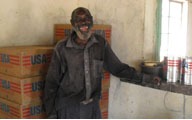
ACDI/VOCA tackles food insecurity in Mudzi and Rushinga districts
Zimbabwe has experienced several promising economic and political developments in recent years, including a relatively successful harvest in 2010, the formation of the Government of National Unity, which helped to stabilize the economy and the introduction of the U.S. dollar, which helped revitalize output and input markets. Emergency food distributions during the lean seasons allowed vulnerable households to preserve their assets and begin rebuilding their livelihoods.
Despite this, the food security situation in Zimbabwe remains extremely fragile, with many households oscillating between emergency and recovery. Food production is threatened by changes in rainfall patterns and markets vulnerable to economic and political shocks. While farmers may be able to provide for themselves for a short period during the year, their household production and income is not sufficient to carry them from one harvest to the next, perpetuating the need for humanitarian assistance.
Promoting Recovery in Zimbabwe (PRIZE)—a three-year, $37.8 million USAID P.L. 480 Title II program—aimed to reduce chronic hunger and food insecurity in the rural districts of Mudzi and Rushinga by addressing immediate emergency food needs and investing in longer-term agricultural development.
As part of a consortium with Catholic Relief Services and CARE, ACDI/VOCA collaborated with its local partner, Community Technology Development Trust (CTDT), to implement an integrated program that improved the availability of and access to food through a number of activities, including:
- Vulnerable group feeding (VGF)
- Food for asset creation, improved agricultural productivity and conservation farming
- Improved access to markets using the value chain approach
- Capacity building in livestock management
- Improved access to financial services through village savings and loans
Emergency Food Delivery
In 2010, ACDI/VOCA provided emergency food aid, or VGF, to 47,587 beneficiaries, focusing on the most food-insecure populations, as identified in partnership with local stakeholders.
During the food distribution, PRIZE staff provided community members with guidance on nutrition and the nutritional needs of different family members, including pregnant and nursing women and young children, to better ensure that all household members benefit from the program.
The emergency food delivery bolstered vulnerable households so members could carry on productive economic activities and conserve assets like seeds and livestock for the following planting season instead of consuming or selling them. It reduced the need for families to engage in high-risk coping strategies or illegal activities, and it allowed households to spend their scarce cash resources on other essentials, like medical care.
Agricultural Development
The limited availability of water remains among the main impediments to sustainable recovery in PRIZE project areas. Smallholder farmers, who make up the majority of the rural population in the target districts, are dependent on rain for crop and livestock production. Recurrent droughts and dry spells in the already dry zones can devastate smallholders’ production and prevent them from moving out of poverty. Livestock production, a promising livelihoods possibility in the area, also faces challenges from the lack of water.
Under PRIZE, ACDI/VOCA and its program partners implemented several longer-term agricultural development initiatives to boost local food supplies, strengthen local markets, increase farmers’ incomes and foster resilience.
Over the life of the project, PRIZE agricultural activities under a Food For Asset (FFA) component helped more than 24,670 food-aid recipients (excluding VGF recipients) to create or improve household and community productive assets as well as reduce their reliance on rain-fed agriculture and increase crop and livestock production. In accordance with government policies that aim to ensure that workers are available for local crop production, PRIZE FFA activities were seasonal and targeted. Activities ranged from developing small and large irrigation schemes to homestead garden clusters and livestock dip tanks.
In addition, PRIZE staff:
- Trained area farmers in conservation agriculture techniques, farming as a business strategies and methods to improve livestock production
- Employed a market-based approach to analyze value chains and engage the private sector to develop income-generation strategies
- Facilitated access to agriculture price information and connect farmers to markets by creating linkages between farmer groups and the private sector
- Worked with farmer groups to form village savings and loan groups to encourage people, mostly women farmers, to accumulate savings and borrow money for income-generating activities.
Finally, PRIZE staff worked with communities to employ disaster risk-reduction strategies to reduce communities’ vulnerability to future shocks.





